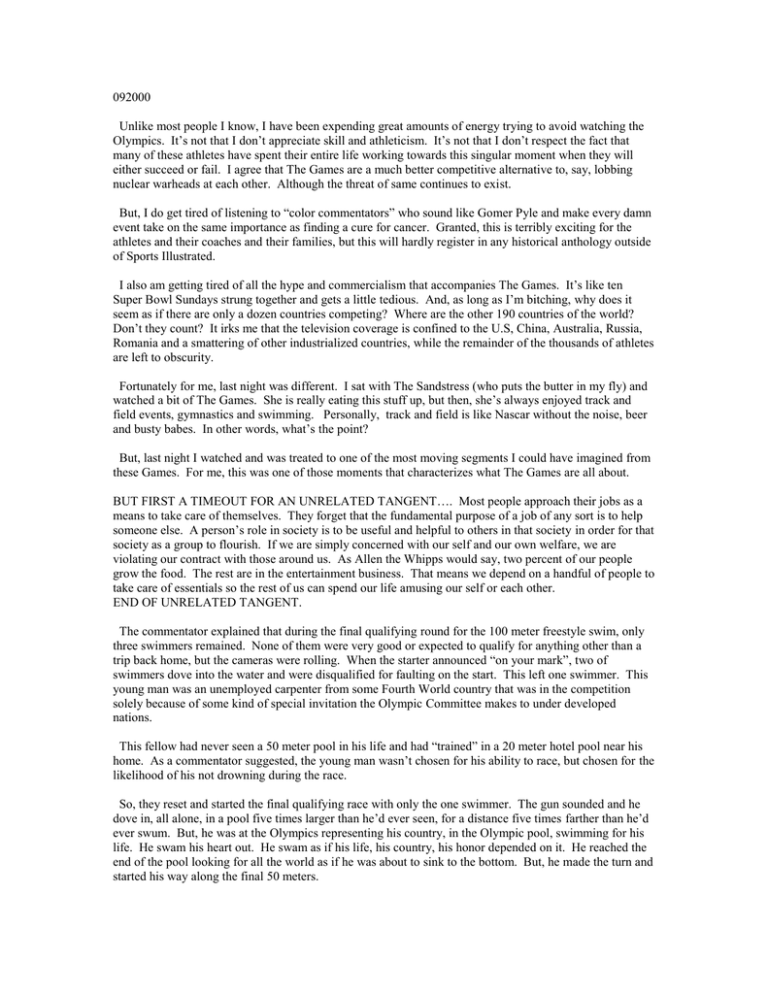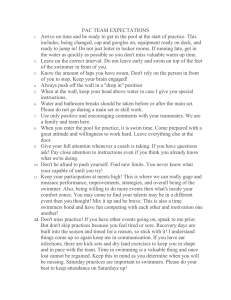092000 Unlike most people I know, I have been expending great...
advertisement

092000 Unlike most people I know, I have been expending great amounts of energy trying to avoid watching the Olympics. It’s not that I don’t appreciate skill and athleticism. It’s not that I don’t respect the fact that many of these athletes have spent their entire life working towards this singular moment when they will either succeed or fail. I agree that The Games are a much better competitive alternative to, say, lobbing nuclear warheads at each other. Although the threat of same continues to exist. But, I do get tired of listening to “color commentators” who sound like Gomer Pyle and make every damn event take on the same importance as finding a cure for cancer. Granted, this is terribly exciting for the athletes and their coaches and their families, but this will hardly register in any historical anthology outside of Sports Illustrated. I also am getting tired of all the hype and commercialism that accompanies The Games. It’s like ten Super Bowl Sundays strung together and gets a little tedious. And, as long as I’m bitching, why does it seem as if there are only a dozen countries competing? Where are the other 190 countries of the world? Don’t they count? It irks me that the television coverage is confined to the U.S, China, Australia, Russia, Romania and a smattering of other industrialized countries, while the remainder of the thousands of athletes are left to obscurity. Fortunately for me, last night was different. I sat with The Sandstress (who puts the butter in my fly) and watched a bit of The Games. She is really eating this stuff up, but then, she’s always enjoyed track and field events, gymnastics and swimming. Personally, track and field is like Nascar without the noise, beer and busty babes. In other words, what’s the point? But, last night I watched and was treated to one of the most moving segments I could have imagined from these Games. For me, this was one of those moments that characterizes what The Games are all about. BUT FIRST A TIMEOUT FOR AN UNRELATED TANGENT…. Most people approach their jobs as a means to take care of themselves. They forget that the fundamental purpose of a job of any sort is to help someone else. A person’s role in society is to be useful and helpful to others in that society in order for that society as a group to flourish. If we are simply concerned with our self and our own welfare, we are violating our contract with those around us. As Allen the Whipps would say, two percent of our people grow the food. The rest are in the entertainment business. That means we depend on a handful of people to take care of essentials so the rest of us can spend our life amusing our self or each other. END OF UNRELATED TANGENT. The commentator explained that during the final qualifying round for the 100 meter freestyle swim, only three swimmers remained. None of them were very good or expected to qualify for anything other than a trip back home, but the cameras were rolling. When the starter announced “on your mark”, two of swimmers dove into the water and were disqualified for faulting on the start. This left one swimmer. This young man was an unemployed carpenter from some Fourth World country that was in the competition solely because of some kind of special invitation the Olympic Committee makes to under developed nations. This fellow had never seen a 50 meter pool in his life and had “trained” in a 20 meter hotel pool near his home. As a commentator suggested, the young man wasn’t chosen for his ability to race, but chosen for the likelihood of his not drowning during the race. So, they reset and started the final qualifying race with only the one swimmer. The gun sounded and he dove in, all alone, in a pool five times larger than he’d ever seen, for a distance five times farther than he’d ever swum. But, he was at the Olympics representing his country, in the Olympic pool, swimming for his life. He swam his heart out. He swam as if his life, his country, his honor depended on it. He reached the end of the pool looking for all the world as if he was about to sink to the bottom. But, he made the turn and started his way along the final 50 meters. By now the people in the stands, who initially treated this spectacle as an amusing display of futility, were now beginning to cheer and applaud as the little man from some backward country plowed through the water towards the finish. As he passed the three-quarter mark, it looked like his arms and legs would no longer propel him through the water. But, he dug deep into his heart and pushed on. Closer and closer to the finish. Many in the crowd were no on their feet cheering and applauding his courage and determination. Finally, with what looked like the very last ounce of strength and energy he possessed, he pushed himself through the water and touched the wall. Race over. He had finished. He had won. Against incredibly odds, he had won his race against time, water, history. He earned and received a standing ovation. He gave an Olympian effort. He should have been given a medal. This was a singular and spectacular Olympic moment. I’m glad I got to see it.







